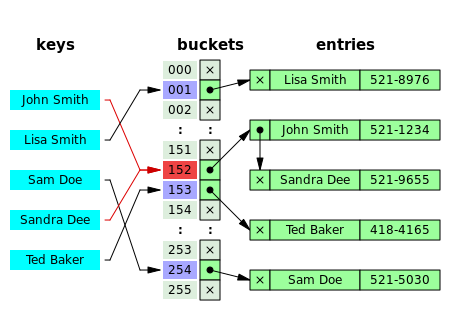Difference between revisions of "Chained Dictionary Assignment"
| Line 2: | Line 2: | ||
In this and the follow up [[Sorted_Dictionary_Assignment|Sorted Dictionary]] studio, you will build three implementations of a dictionary. Each will be a persistent, mutable data structure, so you can expect to use the [https://smlfamily.github.io/Basis/general.html#SIG:GENERAL.!:VAL ref] feature of SML, either directly or via the mutable [https://smlfamily.github.io/Basis/array.html Array structure]. | In this and the follow up [[Sorted_Dictionary_Assignment|Sorted Dictionary]] studio, you will build three implementations of a dictionary. Each will be a persistent, mutable data structure, so you can expect to use the [https://smlfamily.github.io/Basis/general.html#SIG:GENERAL.!:VAL ref] feature of SML, either directly or via the mutable [https://smlfamily.github.io/Basis/array.html Array structure]. | ||
=Background= | =Background= | ||
| − | == | + | ==SML== |
| − | |||
| − | |||
===ref=== | ===ref=== | ||
<onlyinclude> | <onlyinclude> | ||
| Line 33: | Line 31: | ||
===Mutable Array=== | ===Mutable Array=== | ||
[https://smlfamily.github.io/Basis/array.html SML Array structure] | [https://smlfamily.github.io/Basis/array.html SML Array structure] | ||
| + | |||
| + | ==HashTable== | ||
| + | <youtube>shs0KM3wKv8</youtube> | ||
=Dictionary= | =Dictionary= | ||
Revision as of 18:38, 28 February 2022
Contents
Motivation
In this and the follow up Sorted Dictionary studio, you will build three implementations of a dictionary. Each will be a persistent, mutable data structure, so you can expect to use the ref feature of SML, either directly or via the mutable Array structure.
Background
SML
ref
fun get_value_at_reference(reference : 'a ref) : 'a =
!reference
fun set_value_at_reference(reference : 'a ref, next_value : 'a) : 'a =
let
val previous_value = !reference
val _ = reference := next_value
in
previous_value
end
(* alternate version
fun set_value_at_reference(reference : 'a ref, next_value : 'a) : 'a =
let
val previous_value = !reference
in
( reference := next_value
; previous_value )
end
*)
Mutable Array
HashTable
Dictionary
Signature
signature DICTIONARY = sig
type (''k,'v) dictionary
val get : ((''k,'v) dictionary *''k) -> 'v option
val put : ((''k,'v) dictionary *''k *'v) -> 'v option
val remove : ((''k,'v) dictionary *''k) -> 'v option
val entries : (''k,'v) dictionary -> (''k*'v) list
val keys : (''k,'v) dictionary -> ''k list
val values : (''k,'v) dictionary -> 'v list
end
Spec
get
Behaves much like java.util.Map<K,V>'s get(key) method except instead of returning null or the associated value, it returns an option.
put
Behaves much like java.util.Map<K,V>'s put(key,value) method except instead of returning null or the previously associated value, it returns an option.
remove
Behaves much like java.util.Map<K,V>'s remove(key) method except instead of returning null or the previously associated value, it returns an option.
entries
Behaves much like java.util.Map<K,V>'s entrySet() method.
keys
Behaves much like java.util.Map<K,V>'s keySet() method.
values
Behaves much like java.util.Map<K,V>'s values() method.
HasEntriesFn
All three implementations of dictionary can reuse the same functions which given a list of entries produce the keys and values.
One of List's higher order functions can be useful here. Which one is it?
functor HasEntriesFn (HasEntriesParameter : sig
type (''k,'v) dictionary
val entries : (''k,'v) dictionary -> (''k*'v) list
end) : HAS_ENTRIES = struct
open HasEntriesParameter
fun keys(dict : (''k,'v) dictionary) : ''k list =
raise Fail "NotYetImplemented"
fun values(dict : (''k,'v) dictionary) : 'v list =
raise Fail "NotYetImplemented"
end
HasChainingFn
functor HasChainingFn (HasChainingParameter : sig
type (''k,'v) dictionary
val getChainOfEntriesForKey : ((''k,'v) dictionary * ''k) -> (''k*'v) list
val setChainOfEntriesForKey : ((''k,'v) dictionary * ''k * (''k*'v) list) -> unit
end) : HAS_CHAINING = struct
open HasChainingParameter
SingleChained Implementation
signature SINGLE_CHAINED_DICTIONARY = sig include DICTIONARY
val create : unit -> (''k,'v) dictionary
end
Hashtable Implementation
signature HASHED_DICTIONARY = sig include DICTIONARY
type ''k hash_function = ''k -> int
val create_hashed : (int * ''k hash_function) -> (''k,'v) dictionary
end
Testing
file: sml run_chained_testing.sml
in folder: src/test/sml/dictionary/chained
Pledge, Acknowledgments, Citations
| file: | studio-dictionary-pledge-acknowledgments-citations.txt |
More info about the Honor Pledge
